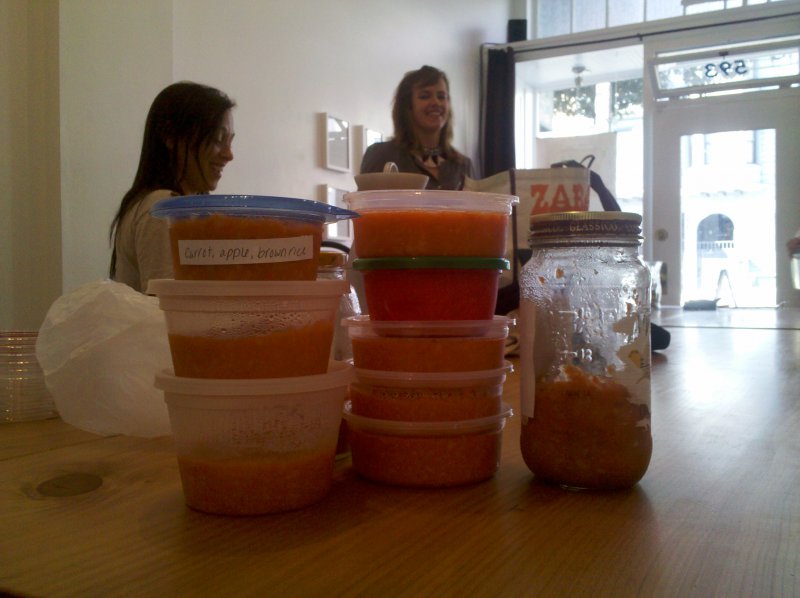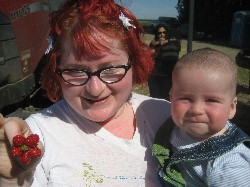I barely have time to write this story, never mind puree several batches of vegetables and grains every week. Like so many of us, I’m part of a working family. A typical workday for me ends at 3:00, where the baby and I race out the door to pick up my son at preschool. We return home at 5:00, ingredients in tow to slap together a healthy, semi-delicious meal for our family dinner hour at 6:00. Then bath, bed, dishes laundry, 30 minutes of Colbert…rinse, repeat. This temporal juggling act is difficult, but magically just-manageable every day. Toss an additional element into the mix – such as the need to create an entirely different menu of prepared first foods for my infant son – and the daily schedule comes to a crashing conundrum.
For my family, buying baby food was not an option. I’m a food writer and a passionate food advocate, thus I do all that I can to support the entire field-to-fork system of slow, whole foods. The expense, the soulless, unknown ingredients, the unwanted packaging, etc. made the store-bought stuff untenable, and any of the better boutique baby foods on the market were simply outside our budget. I am DIY-compulsive, and in my obsession to provide every opportunity for my second son as I did my first (a common mother’s guilt of affliction), I felt that owning my baby’s diet was a must.
And I paid to fuel this guilt’s fire with a parent’s most precious commodity – time. After the kids went to bed, I’d be roasting apples, peeling carrots, and grinding barley until nearly midnight. My nanny began to assist with some sweet potato and zucchini prep, and his help certainly took off some of the pressure. But to keep up with my high-chair critic who craved flavor and variety, we needed a monumental household babyfood culinary revolution. And we found the strength, value, and support we needed by creating and hosting our own local babyfood exchange.

The concept is familiar; we simply followed the model of a soup swap that I attended last winter and cookie swaps I’ve attended in the past. In a nutshell: everyone makes a whole lot of one thing, we meet at one place and time, and we trade, resulting in variety and bounty for all. But unlike other food swaps I have attended in the past, feeding babies has a gravitas, a responsibility and depth beyond the typical potluck. And to share this intimate parental responsibility with our community took the idea of a food trade to a whole new level.
“I love the babyfood swap,” extols Amy Cole, mother of 10-month-old attendee Ever, who credits the gatherings with getting her baby to warm up to solid food. “When I made food for [my first child], I remember what a pain-in-the-ass it was and I lost steam really quickly. I was putting in all this effort and half the food she was so disinterested in. I am so excited to share the burden of it.” Cole is thankful that the swap provides her and her baby with the “exposure and diversity” to new foods as well. “It completely inspired me to start giving her new foods and more food from my plate.” Trading cookies is fine and dandy, but our babies have to eat.
Here’s how it worked: I contacted 18Reasons, my local non-profit food and arts space. (Certainly not everyone has one of these around the corner, but a home or a local park or community center would also suffice.) I chose Fridays as the gathering day, thinking that’s when stay-at-home parents and those who worked part-time are most likely be home. I chose 11:00 in the morning as a good time to catch 6-12 month-old babies awake and jolly.
I sent an email out to all of the parenting listserves announcing the event, asking everyone to bring themselves, their babies, and ten one-cup containers of homemade, organic babyfood ready-to-swap. Together, we sipped tea, nibbled muffins, and affixed labels with contents and dates. We eyeballed each other’s little ones and had the usual parental chit-chat about sleep, diet, crazy kid behavior, etc.
Best of all, I arrived with ten cups of mashed roasted pears (from a friend’s tree), lentils, and brown rice, and I left with a dietary plethora for my baby to enjoy for the next month: brown rice, caramelized onions, and curried lentils; roasted chicken, spinach, and rice; yam and apple; quinoa, zucchini, and white beans among them. Bonus points to some attendees, like Savet Doherty, there with her 8-month-old son, Finn, who brought food made with apples from her own tree that if not prepared in bulk, “would otherwise have gone to waste”, and the woman who’d included winter greens from a visit to a local farm. My finely-chopped gold was taken home, served immediately, and much of it frozen for later use.
And the benefits of the food swap continue to manifest. As usual, the strength of the community is far greater than the sum of its parts. Each family saves time in the kitchen: If I’m steaming green beans and cooking oatmeal, it’s almost the same amount of effort to make two- or three-times my usual amount. Our kids don’t get sick of our own cooking. Many parents, such as Doherty, are “blown away by whole new combinations of things I hadn’t even considered,” – such as millet, cottage cheese, and carrot – “because I had only ever before seen babyfood on the shelf.”
As a result, the babies also end up eating better. If we have delicious homemade food on-hand, we time-pressed caregivers are less likely to reach for expensive, less-nutritious tiny store-bought jars, boxes of instant cereal, or jarred applesauce.

But perhaps the greatest gift exchanged here was meeting like-minded parents who share the same values. Together, we hashed out when/if we’d start feeding our children whole eggs, nuts, wheat, or other common allergens. We pondered the tome of cooking for infants and toddlers, Super Baby Food, and other cookbooks. With our food processors revved into overdrive, we tackled the importance of feeding our children the best food we could possibly conjure and the challenges of life with a young family.
Together we were literally trusting strangers to nurture one of our most precious assets – truly no small feat when you roll that around on your tongue for a moment. I had wondered if this aspect of a babyfood exchange would scare some people away, but judging by the frequent repeat attendees, it’s a safety issue that most of us are willing to trust our instincts on. Says Doherty, “I personally didn’t have any fear at all, but I had a friend who said, ‘What if you get some crazy lady who poisons the babies?’ I said, ‘You can get that at the Gerber plant, too.’” And Cole found herself wondering, “Do on of their kids have a cold right now? Did they wash their hands? We’re all taking a leap of faith here, but I managed to put those anxieties off to the side for a while.”
Now that we have four swaps under our belt, some of the organizational kinks have been worked out. We’d debated between spooning out servings on-site or coming with filled containers, and we’ve decided that the latter seems easier. I bring the coffee every gathering, and the space shells out for tea and some small snack. I’ve changed to announcement to include more information on the foods people should prepare, reminding parents not to add sugar, salt, citrus, etc., and asking that they emphasize local and seasonal foods. We’ve also worked out a regular schedule, the second Friday of the month, so that families can plan accordingly.
Now, as my son is nearing a year and I’m grasping that he won’t be eating babyfood forever, I am still so in love with the babyfood swap concept that I am committed to making the event happen even after we’ve outgrown it. I believe all babies should have the opportunity to eat well, and I am happy to continue with any small aspect of making a family’s life easier. When we feed our children well, we nurture ourselves and the terrain from which we draw. Together and collectively we have so much to save, so much to gain, and so much to grow.

(all photos courtesy of the author)









